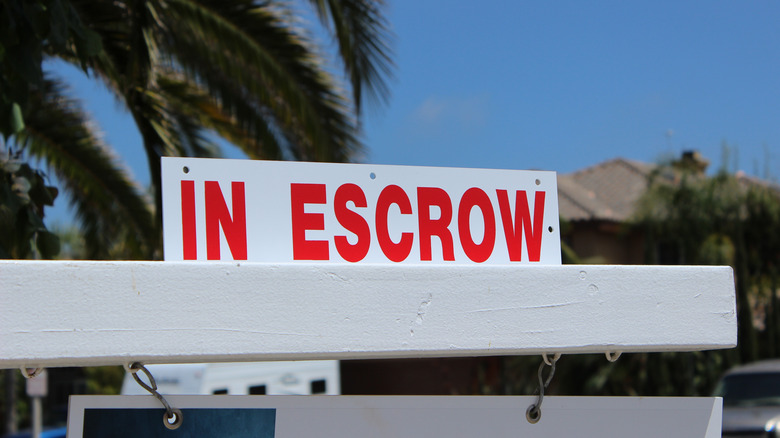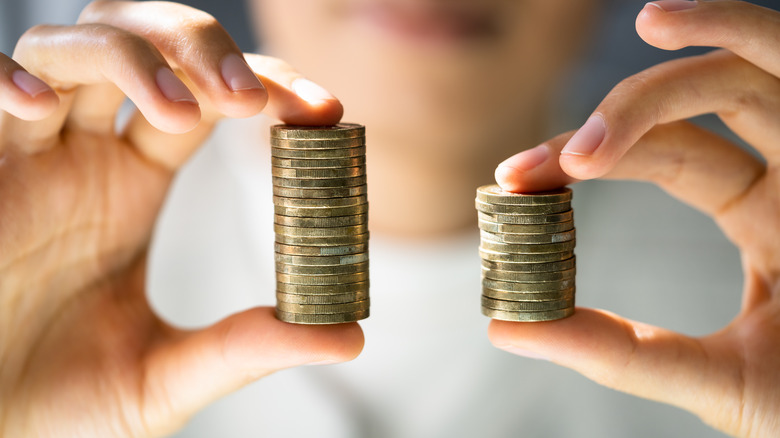What Is An Escrow Shortage In Real Estate?
Everyone can agree that buying a house is a massive financial commitment. In addition to the price of purchasing a home, there are extra fees such as property taxes and home insurance. But luckily, you won't be handling all of these costs by yourself.
Whether you have done extensive research or were even just mildly involved with the home-buying process, you couldn't have missed the term, "escrow account." According to Rocket Mortgage, these are holding accounts that either keep your deposit until you close on your house or be used to pay your real estate costs, such as taxes and insurance. Instead of having to pay a significant sum all at once when the bills are due or juggling multiple bills each month, you can consolidate these expenses and pay the total off in monthly installments.
What you could have missed is the term "escrow shortage," which occurs when your account is short on funds. Facing an escrow shortage out of the blue can sometimes be financially fatal to unprepared homeowners. So let's take a look at what causes escrow shortages and how you should go about paying this shortage back.
What is an escrow shortage?
Obviously, you can't fix an escrow shortage if you don't know what an escrow account is. As Nolo explains, in addition to the cost of your mortgage loan, your mortgage company or home loan service may require you to establish an escrow account. In this case, mortgage rates and other supplementary charges like property taxes and home insurance will be included in the monthly mortgage payment. This monthly payment is automatically deposited into an escrow account by your mortgage lender, making the payment process simpler for you as a homeowner. And that's essentially what an escrow account is. Simple!
To guarantee that you have enough money to pay the escrow fees, there is usually a minimum balance that must be maintained. Most mortgage firms insist on at least two months worth of payments being held in escrow as a safety net (via Quicken Loans). However, these costs can fluctuate due to changes in your property value or personal credit score, potentially resulting in your escrow account being depleted. This is known as an escrow shortage.
Although your escrow account may still have a positive balance (due to the mandatory two-month buffer), it will not have sufficient funds to cover future increases in tax or insurance. The monthly escrow payments will rise as a result of these changes, and you will be responsible for addressing the shortage.
How do you pay your escrow shortage?
There will be a gap between your current account balance and the new monthly payment amount due if you are in an escrow shortage but have not yet gone into a negative account balance. This is the reason homeowners are encouraged to have a two-month deposit.
It's unfortunate that you have no control over local property tax rates or value hikes that tend to cause these escrow shortages, but there are a few strategies to pay it back and restore your account balance. One such strategy, according to Rocket HQ, is to make monthly payments over a 12-month period to cover the shortage. Another solution is to pay back the shortage all at once. In either case, the best option for you will have to do with how much you owe and your financial situation at the time.
According to Mortgage Maestro Group, one of the better ways to hedge an escrow shortage is to stay aware and up to date on your property tax assessment and homeowner's insurance, since these cost increases can't always be anticipated in advance. You can also shop around for the best deal on your home insurance. You might discover whether a different provider or policy offers a lower premium. It's also a good idea to have a separate rainy-day fund, if possible, to give yourself a buffer if needed.


